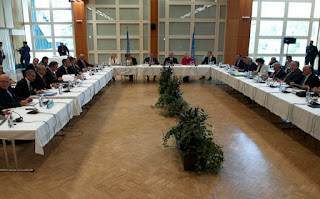Demolition Derby versus Pericles
Undeniably, the riots of December 2008 in
A demolition derby is in place, in full swing while we, most ordinary citizens, watch stupefied, irritated, apathetic at times and at a loss to react at others. I keep telling myself that the time to rebuild is here yet is this just wishful thinking on my part? Am I blinded by the incompetence that prevails, unable or not wanting to accept the reality that is my country? And in my perpetual inner turmoil the idea of flight becomes all the more prescient. Yet the need to resist, to contribute to changing the reality, to convert the downswing into an upswing is just as great, if not a more profound call.
In his Funeral Oration delivered in 431 BC, Pericles says:
“Our form of government does not enter into rivalry with the institutions of others. Our government does not copy our neighbors', but is an example to them. It is true that we are called a democracy, for the administration is in the hands of the many and not of the few. But while there exists equal justice to all and alike in their private disputes, the claim of excellence is also recognized; and when a citizen is in any way distinguished, he is preferred to the public service, not as a matter of privilege, but as the reward of merit. Neither is poverty an obstacle, but a man may benefit his country whatever the obscurity of his condition. There is no exclusiveness in our public life, and in our private business we are not suspicious of one another, nor angry with our neighbor if he does what he likes; we do not put on sour looks at him which, though harmless, are not pleasant. While we are thus unconstrained in our private business, a spirit of reverence pervades our public acts; we are prevented from doing wrong by respect for the authorities and for the laws, having a particular regard to those which are ordained for the protection of the injured as well as those unwritten laws which bring upon the transgressor of them the reprobation of the general sentiment.” (http://www.wsu.edu/~dee/GREECE/PERICLES.HTM)
Am I and my fellow citizens not deserving of a political and social system described by Pericles? Wasn’t the return of Democracy in 1974 supposed to represent the return of Pericles’ enlightened democracy? Unfortunately, this is not the case.
Stay, fight, contribute, I tell myself. “Ask not what your country can do for you but what you can do for your country” is probably the most apt, accurate description of what is wrong with
Clientelism and corruption have brought us to a great extent to the brick wall we seem unable to pull down. We have become demandeurs instead of participants in the political life of the country, accepting mediocrity in the shape of lifelong public sector jobs instead of contributing to the creation of a vibrant meritocracy with world class education, regional leadership, and the like. We have forgotten not only our heritage (sic. the attempts to put fire to the National Archaeological Museum and the National Library, to deface the University of Athens among other public and historic buildings, and to use the Acropolis for political sloganeering) but the fact that its values transcend our sovereign and temporal borders.
At a time when real GDP in the United States, Japan and the Euro-zone countries is in decline with fall in output and rising unemployment with the probable decline in global output growth for the first time since 1950, the street protests are indicative of a growing malaise among the young generations of rage, that the future is not as bright as it is meant to be. Paradoxically, as a result, necessary reform of education and social systems are put on hold as in this climate of anger, a proper understanding of what needs to be done is impossible. If one is to add the new tangible threat of climate change and the need to cope with it, the frustration grows.
And herein lies the fascination with the Greek case and the fears of its exportation elsewhere in



Comments